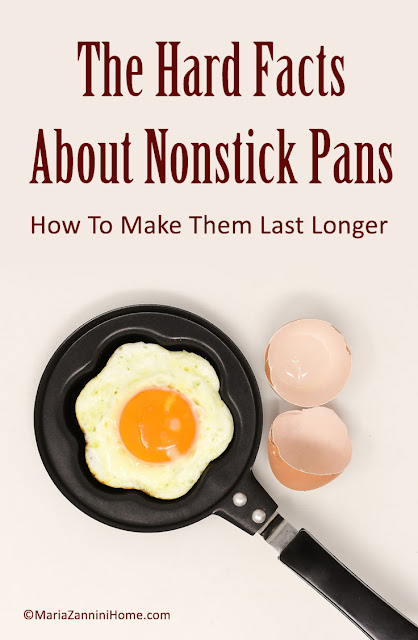The Hard Facts About Nonstick Pans
For the longest time I thought I was doing something wrong because my nonstick skillets wouldn't last more than a few years. I even bought high dollar cookware, but their lifetimes were barely better than the cheap pans.
Finally, I switched to hard anodized skillets. I generally got a couple more years out of them.
Still, considering the cost you'd think cookware should last a lifetime. Only my cast iron skillets will outlive me by generations.
I decided to do some serious research before I forked over any more dough to this folly. Imagine my surprise when experts claim that the nonstick cookware is NOT designed to last more than five years.
I wasn't happy about the answer but at least I felt a little better about myself. I was sure I was somehow responsible for their early demise.
Nonstick aluminum pans are my least favorite. There are some studies that suggest cooking on aluminum will elevate your risk for Alzheimer's. For this reason I 'stick' to hard anodized steel skillets, and won't recommend aluminum.

Like regular cast iron, they're heavy, so it's not my first choice for everyday cooking. Now if you're looking for something to stick in the oven or heat for many hours, this is a great pot.

For my money, I prefer Calphalon, though I have bought Cuisinart with near equal satisfaction. They're heavy enough to withstand some punishment, and it comes in several price points depending on your preference. I generally choose the mid-range.

When we combined houses, I kept the large skillet and a couple of sauce pans.
By the way, the best steel cookware I ever used was All-Clad. It wasn't mine, but I cooked on it once and could definitely tell the difference in quality.
Finally, I want to mention cast iron. Heavy and cumbersome, but if you season it right it will outlast your children's children. A cast iron skillet is phenomenal for steaks or anything else that requires high heat. You can bake with it too. Greg has made the best pizza using the lowly cast iron skillet.
Note: This is the one piece of cookware that I wouldn't hesitate to buy at a garage sale or thrift store. They could be grungy and ugly, but some elbow grease with a wire brush and proper seasoning, and that pan becomes good as new.
Tips for keeping your nonstick pans from dying an early death.
• Try not to use metal cooking implements. Choose wood or silicone spatulas and spoons.
• Use oil or butter rather than cooking spray. I learned the hard way that prolonged use of cooking spray will create a buildup that's impossible to remove.
• If you must use aluminum rather than steel, remember that highly acidic foods react to aluminum and copper. It'll give your food a metallic off-taste.
• Wash them by hand but don't let them sit in water. It's a bone I pick with Greg because he likes to let cookware sit in water to soften dried-on foods. As soon as it's cool enough to touch, I prefer to wash the skillet, towel it dry and let it finish drying on the stove.
As a present to myself this year, I retired my old pans and bought new ones.
How long do you keep a skillet?
**I'm an Amazon affiliate. If you happen to be shopping Amazon, be a pal and start from this link. Thanks! I appreciate it.
This post may contain affiliate links, I earn from qualifying purchases at no extra cost to you. Click here for my disclosure policy


Comments
Maria you mentioned stainless steel for its ease of cleanup if used correctly, I agree. However the beautiful set my Mom gave us as a wedding gift was lost in 2011 and since we only used the one skillet, one small pot and the dutch oven it was replaced with it's cheaper cousin the nonstick set we have now had for 6 years.
The truth in the statement you should only use wooden or silicone, in my case cheaper plastic, spoons and spatulas or the nonstick pan ruins quicker with metal implements.
I've heard of people putting skillets into the dishwasher but I've never tried it. To me, that's strictly for hand washing.
One expert I read said you're better off getting one of the cheaper brands because they'll all conk out on you within the same period of time anyway.
re: cheese
Yeah, cheese is one of those foods better for nonstick pans.
I usually replace my cookware every 3 to four years, basically around time I'm ready to move again lol! I've used Paula Deen cookware, Rachel Ray, and some other fancy name that I can't remember. 3 years in, all have about the same result.
I had a cast iron skillet yet I think I lost it in the move before last. I'll have to get one again and properly season it.
I love my non-stick pans. We don't use anything metal with them. We use wooden spoons or heavy plaster spatulas. We have cast iron but rarely use it.
re: aluminum
That's a claim that's been talked about for decades. I hated to give up my aluminum pans back then, but it's not worth taking the risk.
PS. Believe it or not, I read 'plastic'. I didn't realize it was plaster until you mentioned it.